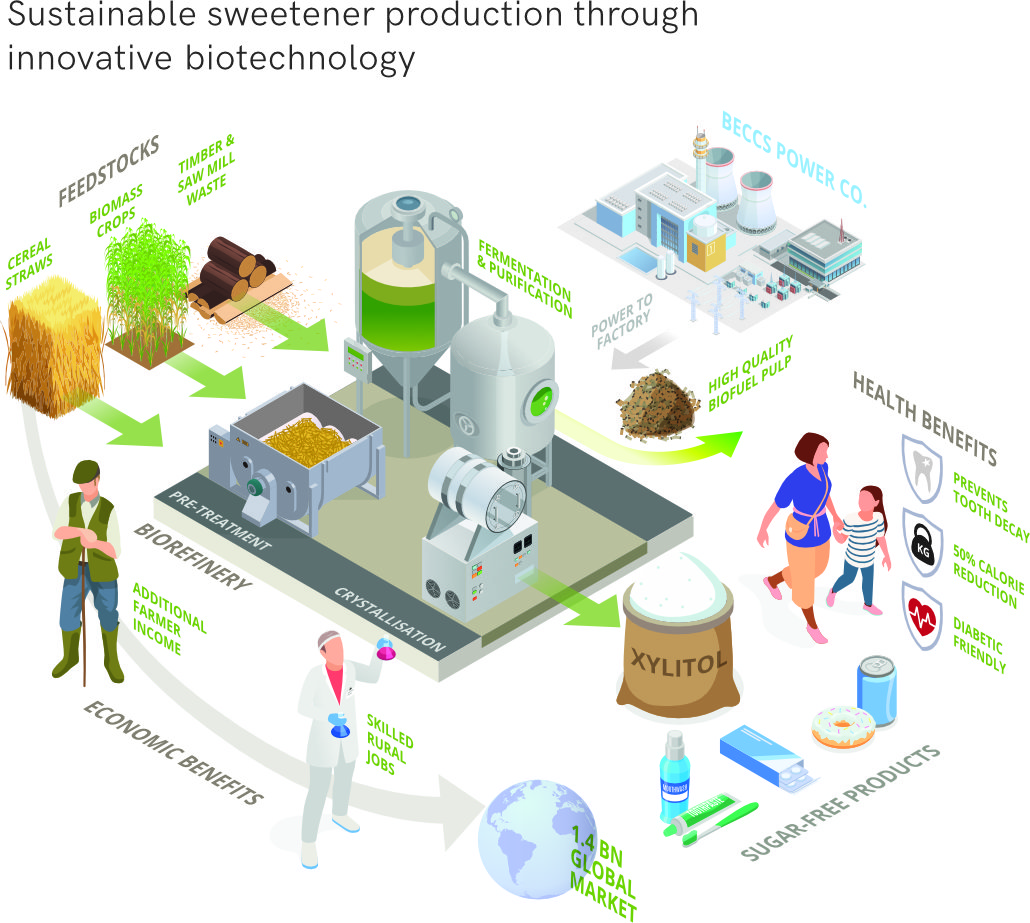Sustainable Sweeteners Impact Case Story
Sustainable Sweeteners

Sustainable Sweeteners: Turning Agricultural Waste into Natural Sugar
ARCITEKBio Ltd., a cleantech company spun out of research at IBERS, is revolutionising the way natural sweeteners are made. Using innovative biotechnology — a process similar to brewing — ARCITEKBio transforms agricultural straw and other plant residues into xylitol, a sustainable and environmentally friendly natural sugar.
Xylitol looks and tastes like sugar, but it’s better for you: it has 40% fewer calories, a low glycaemic index (meaning it causes a slower rise in blood sugar), and even supports dental health.
The Challenge
Traditional xylitol production relies on chemical processes that use toxic catalysts, high temperatures, and generate large amounts of waste. This not only drives up energy use but also increases greenhouse gas emissions and pollution.
At the same time, valuable agricultural by-products — such as sugarcane bagasse (the fibrous material left after sugar extraction) and cereal straws from wheat and oats — are often underutilised, representing a missed opportunity to create value from waste.
The Solution
ARCITEKBio’s proprietary fermentation process uses yeast to convert C5 sugars (xylose) — a type of sugar found in plant material — into xylitol.
This “brewing-like” approach is feedstock-independent (it works with many types of agricultural residue), requires no pre-cleaning or detoxification, and achieves competitive yields and purity.
By tapping into waste streams from agriculture, paper, and pulp industries, ARCITEKBio helps build a circular economy — one where waste becomes a resource — while reducing the environmental footprint of sweetener production.
The Impact
ARCITEKBio’s innovative process delivers significant health and environmental benefits. Compared with traditional methods, it reduces greenhouse gas emissions, uses less energy, and turns waste into valuable products — cutting waste and improving resource efficiency.
This new way of producing xylitol also creates economic opportunities by adding value to agricultural by-products.
Key impacts include:
- Lower greenhouse gas emissions and energy use compared to chemical production
- Reduced landfill waste by converting agricultural residues into valuable products
- New revenue streams for farmers through sustainable use of by-products
- Skilled employment in rural communities, supporting local economies
- Healthier products for consumers — xylitol is low-calorie, supports dental health, and is suitable for people managing diabetes
By meeting the growing demand for sustainable and healthy sugar alternatives, ARCITEKBio demonstrates how biotechnology can deliver both environmental and social value.
Future Directions
After successfully developing their process to pilot scale at the IBERS Biorefining Centre within AberInnovation, ARCITEKBio is now preparing to scale up for commercial production.
The company plans to collaborate with European large-scale biorefining facilities capable of processing vast amounts of agricultural waste. Their next goals are to prove cost-effectiveness and to refine the taste, smell, and appearance of the final product to meet both business and consumer expectations.
Future research will focus on enhancing fermentation efficiency and exploring new applications for the technology.
Conclusion
ARCITEKBio Ltd. demonstrates the power of biotechnology to tackle global challenges in food production and environmental sustainability.
By turning agricultural waste into a valuable natural sweetener, the company is helping to reduce waste, lower emissions, and support a circular economy — while providing healthier options for consumers worldwide.
Downloads
Download our full IBERS Impact Case Stories Booklet here: Innovations for a Changing World Case Story Booklet
